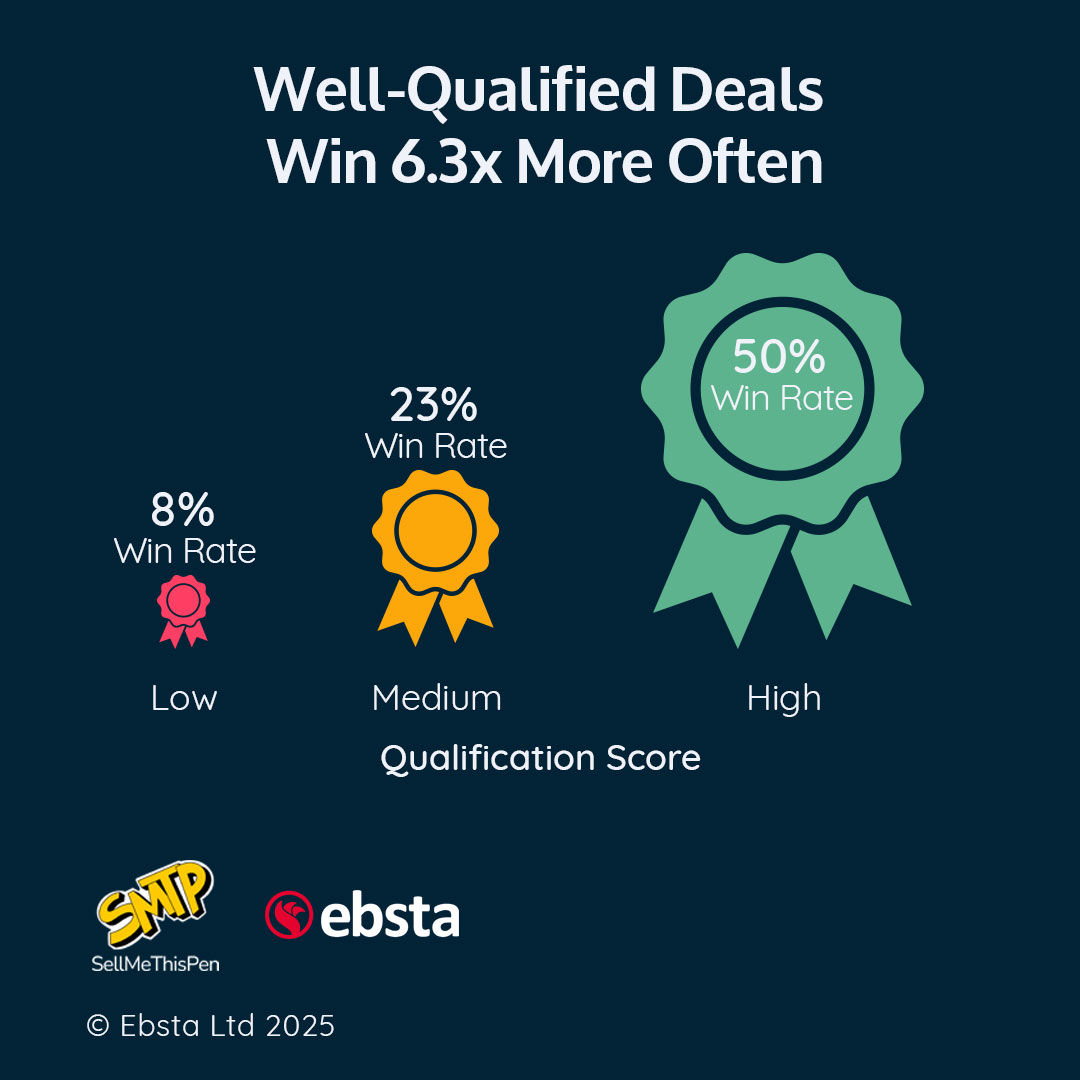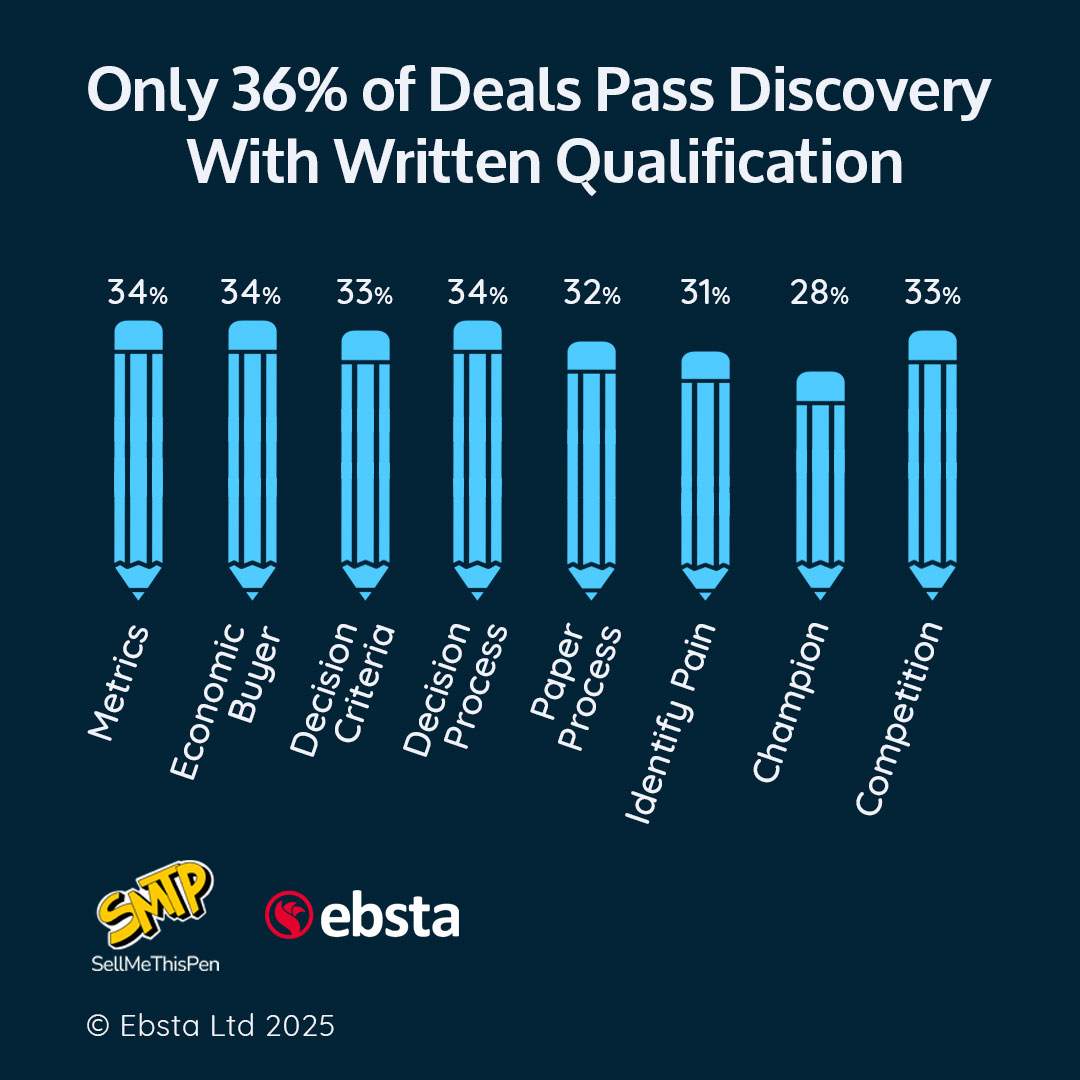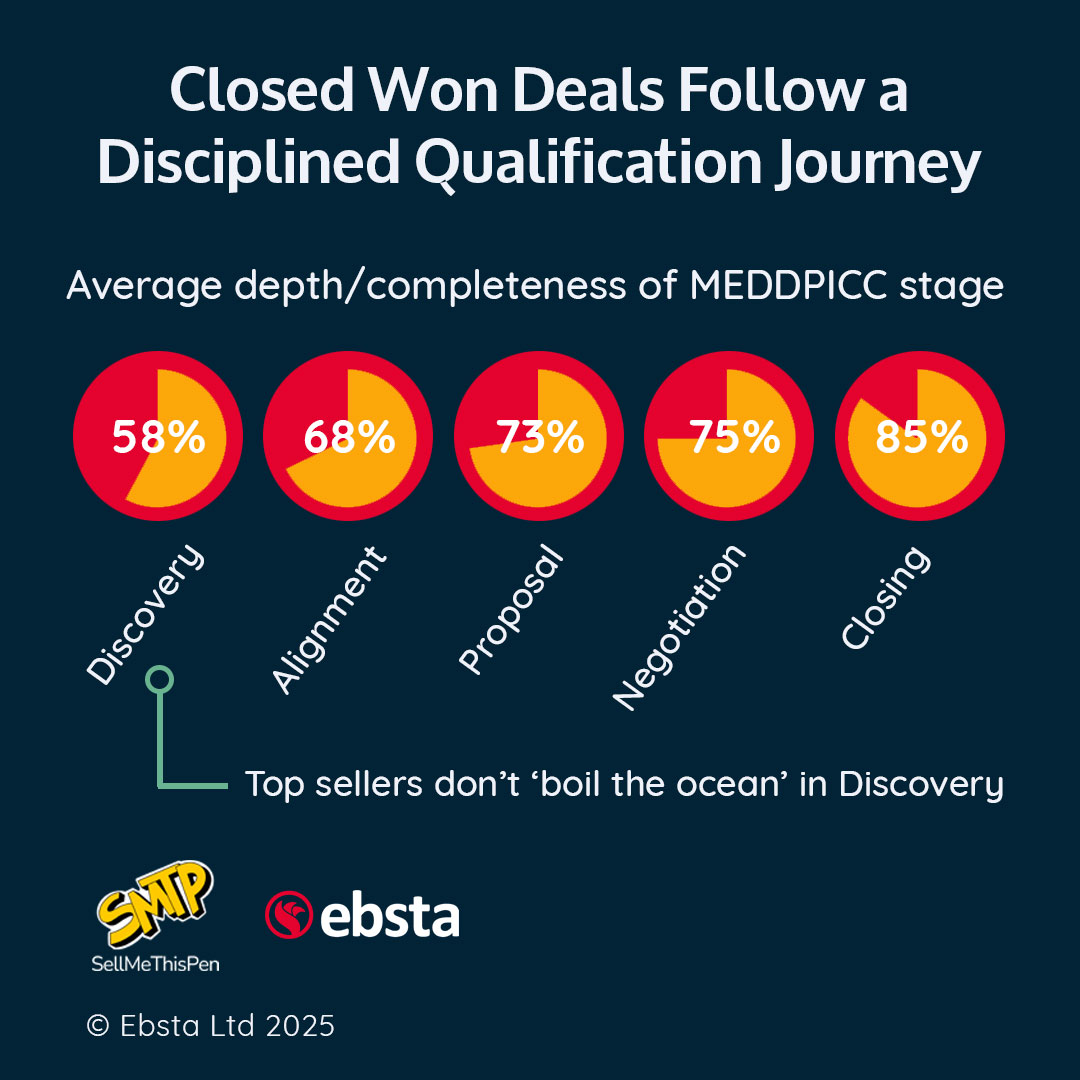
Most buyers today prefer a sales-free experience - no surprise there. But here's the counterintuitive truth: qualification, when done right, is actually the most buyer-centric move in sales. In this article, together with Ebsta we'll explore why rigorous qualification isn't just good practice, it's the difference between thriving and merely surviving in today's competitive sales environment.
Recent analysis of 655,000 opportunities worth $48 billion reveals a startling reality: well-qualified deals have a win rate that is 6.3x higher than poorly qualified ones, closing 21.6% faster on average.

Yet despite this massive impact, only 36% of opportunities that pass Discovery include both a qualification score and supporting notes. This gap represents lost revenue, wasted seller effort, and unreliable forecasts.
Picture Sarah, a seasoned sales rep who just landed what seemed like a perfect prospect. The company fits the ideal customer profile, the contact showed genuine interest, and they even mentioned having budget. Sarah spent three months nurturing this deal, crafting custom proposals, involving solution engineers, and scheduling multiple stakeholder meetings. Then, in the final week, everything fell apart. The "champion" wasn't actually influential, the decision process was murky, and there was no compelling event driving urgency.
This scenario plays out thousands of times across sales floors worldwide. The data shows that sellers spend twice as long on deals that are closed lost as on those that are closed won. With half of all deals ending with no decision, and half of the rest ending as closed lost, most sellers are spending the majority of their time on activities that don't lead to revenue.
Here's where most sales teams get it wrong: they treat qualification as a screening mechanism to filter out unworthy prospects. In reality, great qualification isn't about screening buyers out - it's about helping them get clearer on their pain, their gaps, and what it takes to solve their problem.
Think about it from the buyer's perspective. A well-researched buyer who enters your pipeline isn't looking for more friction. They want clarity. They need help understanding whether your solution truly addresses their core challenges, whether they have the right stakeholders aligned, and whether the timing makes sense for their organization.
Real qualification gives the buyer a reality check. It saves them time, confusion, and future headaches. Imagine helping a buyer uncover that a critical part of their puzzle is missing, like a compelling event, a clear decision process, or realizing they may not be the true champion. That's not friction. That's value.
When we examine the numbers, the correlation between qualification rigor and sales success becomes undeniable:

These aren't just vanity metrics. In today's efficiency-focused GTM environment, where every dollar of seller capacity matters, qualification rigor directly translates to revenue predictability and team performance.
Sales methodologies like MEDDPICC exist for good reason, they provide a structured approach to understanding deal dynamics. But here's the problem: while most teams adopt these frameworks in theory, execution often falls short in practice.
The analysis reveals significant gaps in how sellers apply qualification criteria:

The pattern is clear: sellers either adopt MEDDPICC fully or not at all. The challenge is driving complete adoption rather than partial implementation.

One of the biggest misconceptions about qualification is treating it as a front-loaded checkbox -something to "get through" early in the sales cycle. Top-performing deals prove the opposite: qualification is a continuous discipline that evolves as buyer needs become clearer and stakes get higher.
Analysis of successful deals shows how key qualification criteria develop and deepen at each stage:
This staged progression reveals that elements like Champion strength, Economic Buyer access, and Decision Process clarity don't just appear early—they mature progressively through to negotiation. The insight should serve as a coaching framework: when sellers align their qualification activities to the buyer's decision journey, they unlock faster cycles, stronger conversions, and more accurate forecasts.
What separates elite performers from the rest isn't just how they start qualification - it's how they manage it throughout the entire funnel. Top performers don't waste time on marginal opportunities after Discovery. Instead, they sharpen their focus as deals progress, ruthlessly disqualifying lower-fit opportunities and concentrating effort where it counts most.
Consider the data on one top performer versus average sellers:
This disciplined approach leads to consistently higher conversion rates and significantly less late-stage slippage, freeing up capacity for creating and managing more high-quality pipeline.
In fast-moving markets, sales cycle length isn't just a metric, it's a competitive advantage. The data reveals a clear pattern: deals with higher qualification scores in critical areas like Decision Process validation and Economic Buyer alignment close 21.6% faster on average than partially qualified opportunities.
When sellers take time to identify the right Champion, understand the Decision Process, and validate the Economic Buyer early, it reduces friction in later stages like Proposal and Negotiation.
“Speed isn't about shortcuts - it's about alignment. Qualification brings that alignment earlier in the process.”
In contrast, deals missing key qualification components often stall unexpectedly. Not because the buyer isn't ready, but because the seller is flying blind. Late-stage surprises, unclear Paper Process steps, or hidden objections from overlooked stakeholders extend the cycle and drain seller capacity.
Mastering qualification requires more than understanding frameworks, it demands consistent practice and skill development. The ability to ask the right questions at the right time, navigate complex stakeholder dynamics, and maintain qualification rigor throughout long sales cycles doesn't happen overnight.
This is where tools like AI-powered roleplay platforms can be invaluable for building qualification confidence. Practicing MEDDPICC discovery conversations, handling pushback on sensitive topics, and rehearsing multi-stakeholder alignment discussions in a safe environment helps salespeople develop the muscle memory needed for real buyer interactions.
Skipping rigorous qualification isn't just bad practice—it's malpractice. In an environment where efficiency is everything, doubling down on qualification rigor isn't just smart, it's urgent.
The message is clear: qualification isn't a one-time gate, it's a dynamic, ongoing process that shapes every stage of the deal. When sales methodologies are applied with rigor and reinforced consistently, they become a force multiplier for both speed and accuracy.
Great qualification empowers buyers to make decisions faster, with confidence. It's not about us selling—it's about helping them buy better. And in today's buyer-centric world, that distinction makes all the difference.
The data doesn't lie: well-qualified deals close faster, win more often, and create predictable revenue. The question isn't whether you can afford to invest in qualification rigor—it's whether you can afford not to.
Check out the full report here.